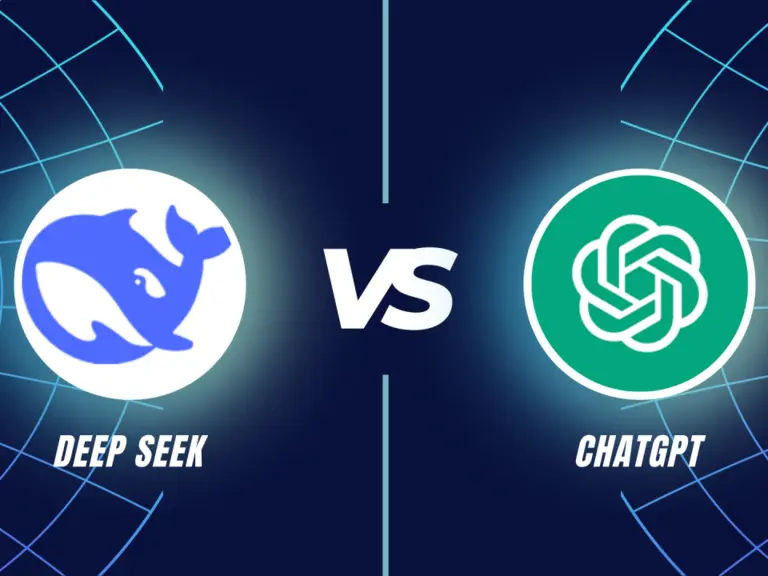In the ever-evolving field of artificial intelligence (AI), large language models (LLMs) have become essential tools for businesses, researchers, and even media professionals. An LLM is a generative artificial intelligence-based model that can be defined as “a deep-learning algorithm that uses massive amounts of parameters and training data to understand and predict text.”
Among the many options available, ChatGPT has emerged as one of the most prominent LLM tool. However the launch of Chinese counterpart DeepSeek appears to present a significant challenge to ChatGPT. Founded in July 2023 by Liang Wenfeng, DeepSeek, released its open-source models for download in the U.S in January 2025. DeepSeek’s AI model quickly jumped to the top of iPhone download charts, including ahead of OpenAI’s ChatGPT.
Both ChatGPT and DeepSeek offer unique capabilities, strengths, and limitations that can meet diverse needs. ChatGPT can be seen as a conversational AI tool while DeepSeek is viewed as an information retrieval and analysis tool. This article is an attempt to provide a brief overview of these two AI platforms’ impact on politics and society. In the rapidly evolving world of technology, tools like ChatGPT and DeepSeek have risen to prominence, not only for their capabilities but also for their profound social and political implications.
DeepSeek and ChatGPT & Their (Potential) Impact
DeepSeek and ChatGPT are both state-of-the-art AI-driven language models, but they are designed with distinct goals and functionalities. DeepSeek is primarily marketed as an enterprise-focused AI solution, emphasizing precision, data-driven insights, and domain-specific customization. On the other hand, ChatGPT, developed by OpenAI is a conversational AI tool that excels in generating human-like text, content creation and facilitating a broad range of applications, from casual conversations to advanced problem-solving.
ChatGPT offers a free tier with access to its basic capabilities, while more advanced features and higher usage limits are available through the ChatGPT Plus subscription plan. DeepSeek offers a free trial or limited free version to allow users to explore its functionalities, and comprehensive access requires a paid subscription.
On the one hand, while both models utilize advanced machine learning techniques, their underlying priorities differ significantly. DeepSeek is often preferred for its analytical depth, while ChatGPT stands out for its adaptability and ease of use.
On the other hand, as they compete with each other today; these tools serve different primary functions: ChatGPT as a conversational AI tool and DeepSeek as an information retrieval and analysis tool. That being said, it is obvious that their broader societal impacts are deeply interconnected with one another. Their societal and political impacts can be summarized through four different but interconnected dimensions (including democratizing knowledge, risks of bias and misinformation, transforming politics, and ethical issues) as explained further below.
Social and Political Impacts
It can be said that ChatGPT and DeepSeek both contribute to the democratization of knowledge. Both tools simplify access to information by providing conversational, human-like responses. For instance, in one research, it is argued that ChatGPT contributes to the democratization of financial knowledge. By breaking down complex ideas into accessible language, these tools can empower users to engage with topics they might otherwise find hard to understand or inaccessible. This experience opens up opportunities for lifelong learning and self-growth.
Despite their potential, both ChatGPT and DeepSeek face criticism for their roles in perpetuating misinformation and bias. ChatGPT’s conversational nature can sometimes blur the lines between factual accuracy and persuasive storytelling. If unchecked, this can lead to the spread of half-truths or unverified claims. In an article, it is stated that, “ChatGPT doesn’t try to write sentences that are true. But it does try to write sentences that are plausible.”
DeepSeek is not immune to bias and inaccuracy either. Furthermore, its use in politically sensitive investigations can raise ethical concerns about privacy, surveillance, and the potential misuse of its insights by private corporations and/or authoritarian regimes including China.
The intersection of AI and politics is another area where ChatGPT and DeepSeek demonstrate significant impact. ChatGPT serves as a platform for political education, enabling users to explore diverse perspectives and build informed opinions. This accessibility can strengthen democratic processes. DeepSeek, with its analytical capabilities, can amplify the power of investigative journalism and advocacy. However, the same tools that empower activists can also be weaponized by political actors to manipulate public opinion. OpenAI has reported instances where ChatGPT was used to create fake news for influencing voter perceptions during the U.S. presidential election.
As vast numbers of users increasingly turn to ChatGPT for guidance, there is a risk of diminishing human interaction and critical thinking. The phenomenon of “AI companionship” underscores a growing reliance on artificial entities, which could have long-term implications for mental health. Hence, the ethical boundaries of access need to be clearly defined to protect individual rights in an era of digital surveillance.
To put it in a nutshell, it can be said that both ChatGPT and DeepSeek have already occupied unique places in the AI landscape. ChatGPT and DeepSeek embody the dual-edged nature of AI’s social and political impact. While they democratize access to knowledge, enhance transparency, and foster civic engagement, they also pose significant risks related to misinformation, bias, privacy, critical thinking, and mental health. Their transformative potential demands that developers, policymakers, and society must adopt a proactive and ethical approach to their deployment. By balancing innovation with accountability, these tools can be harnessed as forces for positive change.

